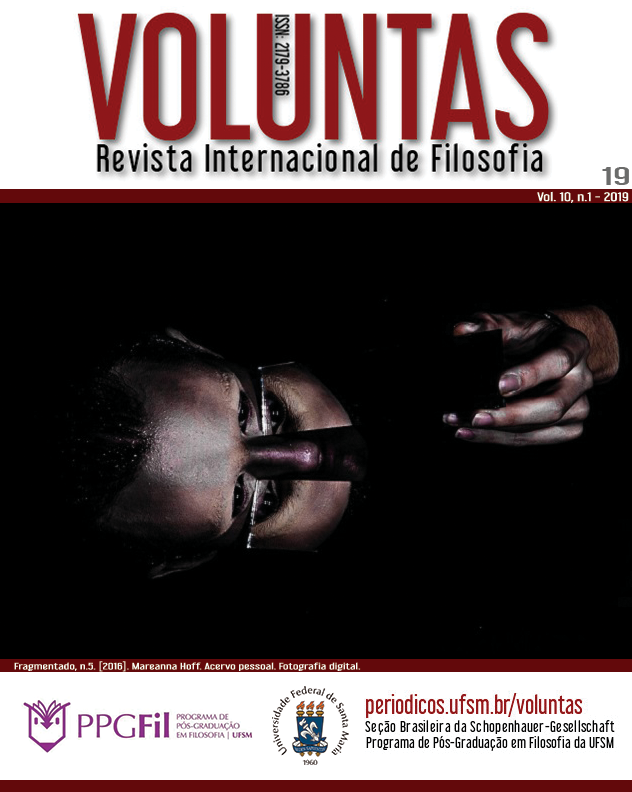An overcoat of clay: affectivity and normativity in the phenomenology of body
DOI:
https://doi.org/10.5902/2179378637901Keywords:
Phenomenology of spectrality, Ancestrality, Historicality, Respect for the dead, HeideggerAbstract
n this paper, I approach the problem of normativity in relation to the dimension of the ancestral possibilities received from the dead. Following the project of a phenomenology of spectrality presented by Hans Ruin, I outline an interpretation of some formal indications, stated by Heidegger in the existential analytic of Being and Time, concerning the Stimmung of being-with-the dead. Respect (Ehrfurcht) is the existential feeling that manifests the already felt attunement with the dimension of ancestrality: the respect for the possibilities capable of a reciprocative rejoinder to a heritance. It follows from the analysis of this feeling, that the ancestral dimension offers the very matter of historical individuation, but does not contain the measure of the adequate response to the possibilities inherited. I conclude by emphasizing that the autonoetic aspect of the feeling of respect for ancestral possibilities reveals the abandonment and vulnerability of the living in the face of a dimension that commands without housing in itself a measure for the right response.
Downloads
References
BAIER, A. Trust and Antitrust. In: BAIER, A. Moral Prejudices. Essays on Ethics. Cambridge: Harvard University Press, 1995, pp. 95-129.
BARASH, J. A. Heidegger and the Metaphysics of Memory. Studia Phaenomenologica, Bucharest, v. 8, 2008, pp. 401-409.
CARMAN, T. Heidegger. In: BERNECKER, S., MICHAELIAN, K. The Routledge Handbook of Philosophy of Memory. London/New York: Routledge, 2017, pp. 557-562.
FORD, A. Action and Generality. In: FORD, A.; HORNSBY, J.; STOUTLAND, F. (Eds.), Essays on Anscombe’s “Intention”. Cambridge: Harvard University Press, 2011, pp. 76-104.
FUCHS, T. Presence in absence. The ambiguous phenomenology of grief. Phenomenology and the Cognitive Sciences, Zurich, v. 17, n. 1, 2018, pp. 43-63.
GADAMER, H-G. Der Tod als Frage. In: Gesammelte Werke. v. 4. Tübingen: Mohr Siebeck, 1999, pp. 161-172.
HARRISON, R. P. The Dominion of the Dead. Chicago: University of Chicago Press, 2003.
HEIDEGGER, M. Anmerkungen I-V (Schwarze Hefte) 1942-1948. Frankfurt am Main: Vittorio Klostermann, 2015.
HEIDEGGER, M. Die Grundprobleme der Phänomenologie. Frankfurt am Main: Vittorio Klostermann, 1989.
HEIDEGGER, M. Hölderlins Hymne “Der Ister”. Frankfurt am Main: Vittorio Klostermann, 1993.
HEIDEGGER, M. Metaphysische Anfangsgründe der Logik. Frankfurt am Main: Vittorio Klostermann, 1978.
HEIDEGGER, M. Reden und andere Zeugnisse eines Lebensweges. Frankfurt am Main: Vittorio Klostermann, 2000.
HEIDEGGER, M. Sein und Zeit. Tübingen: Max Niemeyer Verlag, 1986.
KÄUFER, S. Heidegger on Mineness and Memory. Annales Philosophici, Oradea, v. 2, 2011, pp. 51-65.
MILCHERT, T. Christliche Wurzeln der Todesphilosophie Heideggers. Marburg: Tectum Verlag, 2012.
RATCLIFFE, M. The feeling of being. Journal of Consciousness Studies, Exeter, 2005, v. 12, pp. 43-60.
RATCLIFFE, M. Feelings of Being. Phenomenology, psychiatry and the sense of reality. Oxford: Oxford University Press, 2008.
REIS, R. Aspectos da modalidade. A noção de possibilidade na fenomenologia hermenêutica. Rio de Janeiro: Via Vérita, 2014.
RISSER, J. The Life of Understanding. Bloomington & Indianapolis: Indiana Univesity Press, 2012.
RODRÍGUEZ, R. (2015). La Interpretación Ontológica del Sentimiento Moral. In: RODRÍGUEZ, R. Fenómeno e Interpretación. Madrid: Tecnos, pp. 199-218.
RUIN, H. Spectral Phenomenology: Derrida, Heidegger and the Problem of the Ancestral. In: KATTAGO, S. The Ashgate Research Companion to Memory Studies. Farnham: Ashgate, 2015a, pp. 61-74.
RUIN, H. Housing Spirits: The Grave as an Exemplary Site of Memory. In: TOTA, A.; HAGEN, T. Routledge International Handbook of Memory Studies. New York: Routledge, 2015b, pp. 131-140.
RUIN, H. Anamnemic subjectivity: new steps toward a hermeneutics of memory. Continental Philosophy Review, Zurich, v. 48, 2015c, pp.197-216.
RUIN, H. Speaking to the Dead. Danish Yearbook of Philosophy, Leiden, n. 48-49, 2016, pp. 115-137.
RUIN, H. Being with the Dead. Burial, Ancestral Politics, and the Roots of Historical Consciousness. Stanford: Stanford University Press, 2018a.
RUIN, H. (2018b). Death, Sacrifice, and the Problem of Tradition in. Comparative and Continental Philosophy, London, v. 10, n. 2, pp. 140-150.
SLABY, J. (2008). Affective intentionality and the feeling body. Phenomenology and the Cognitive Sciences, Zurich, v. 7, pp. 429-444.
SLABY, J.; STEPHAN, A. (2008). Affective intentionality and self-consciousness. Consciousness and Cognition, Paris, v. 17, pp. 506-513.
SÓFOCLES. Antígona. Trad. Lawrence Flores Pereira. Rio de Janeiro: Topbooks, 2006.
THEUNISSEN, M. Das erbauliche im Gedanken an den Tod. Traditionelle Elemente, innovative Ideen und unausgeschöpfte Potentiale in Kierkegaards Rede An einem Grabe. Kierkegaard Studies Yearbook, Berlin, 2000, p. 73.
ZUCKERMAN, N. Heidegger and the essence of Dasein. The Southern Journal of Philosophy, Memphis, 2015, v. 53, n. 4, pp. 495-516.
Published
How to Cite
Issue
Section
License
The submission of original manuscripts to this journal implies the transference, by the authors, of the copyrights for printed and digital publication. The copyrights of a published manuscript belong ultimately to the author, and only the copyright for its first publication is reserved to the journal. Authors may only use the same results in other publications explicitly indicating this journal as the medium of the original publication.
Licence
Attribution-NonCommercial-ShareAlike 4.0 International (CC BY-NC-SA 4.0) - This license lets others remix, tweak, and build upon your work non-commercially, as long as they credit you and license their new creations under the identical terms.







